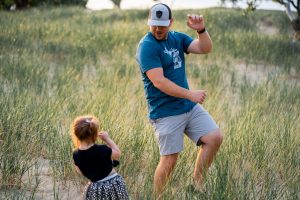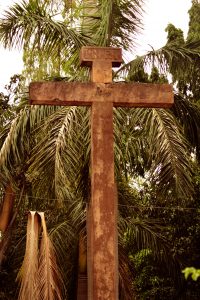These reflections are a part of ELCA World Hunger’s Sermon Starter series which is published via email every Monday. You can sign up for the weekly email here on the right side of the page, if on a computer, or near the bottom of the page, if viewing on a mobile device. Pastor Tim Brown is the writer of these reflections. Pr. Tim is a Gifts Officer and Mission Ambassador for the Lutheran School of Theology at Chicago and a pastor and writer out of Raleigh, NC. You are invited to use the message below for personal devotion as well as prompts for sermon writing.
April 5- Palm Sunday
Isaiah 50:4-9a
Preaching to a camera or a livestream is no easy task, so before we dive into the text, let me say a few things from a preaching perspective.
First, give yourself lots of grace. These are weird times, and no one can plan for this.
Second, do the best you can with what you have. Whether you’re in full vestments in an empty sanctuary, a talking head in your living room, or even just a voice on an audio recording uploaded to a church website, don’t fret too much about what everyone else is doing. You do the best you can.
Finally, as we’re heading headlong into Holy Week, these are rough waters. Holy Week is an embodied week for the church and really is experienced in and through our bodies and other bodies. Figuring out a way to do some of what this week embodies when we’re all finally able to get back together may be important for you, and for your community.
Ok, on to the text we go.
If you decide to preach from Isaiah for Palm Sunday, you will find an abundance of themes that intersect both with the holy day and our current situation.
The prophet begins with, “The Lord God has given me…” which can be a good segue if you’re doing a livestream with audience participation, into a naming of gifts that people can lift up in these days. Invite the congregation to follow Isaiah’s lead and name gifts God has given. They can list them in the chat thread during a livestream or write them down on a piece of paper if following along with a recording.
Isaiah then continues to note that God cajoles the people to wake every morning and to “listen as those who are taught.” How can we be attentive, even in these strange days, to what the Divine is saying to and through us? And, in light of this festival day, how can we be attentive to what Jesus is saying, both in his words and in his actions, as he rides into Jerusalem atop a donkey? What is God in Jesus saying about  humility here? What is God in Jesus saying about the journey? How are we, in these days, able to figuratively, and perhaps literally, take off our coat and cut our palm branches and spread them on the ground, making the path easier for others?
humility here? What is God in Jesus saying about the journey? How are we, in these days, able to figuratively, and perhaps literally, take off our coat and cut our palm branches and spread them on the ground, making the path easier for others?
One of the points about social distancing is that it makes the road of life safer for the most vulnerable populations in these pandemic days. By pausing our routines, sacrificing school or finances, and fasting from social interaction, we are helping to “flatten the curve” so that the most vulnerable among us may be safer. How does this exemplify serving and honoring Jesus by serving and honoring our neighbors?
Finally, the prophet ends with a reminder that it is the Lord God who helps them and entreats us to remember that, though we may be going without for a little while, we are not going alone. God continues to walk in the midst of us, to guide us, to help us…and so we are not without help and aid.
As Joseph Sittler notes in Gravity and Grace, the “authority of the Scripture has to depend on the text’s internal congruity with the human pathos” (p. 47). In other words: it must speak to this time, now. And I dare say that, although this is Palm Sunday, this is for many people the “Third Sunday after Social Distancing”…and maybe the fourth, depending on where you are located.
Preach accordingly.
Matthew 21:1-11
Here’s the decision on every Palm/Passion Sunday, whether you are physically in the parish or virtual: which Gospel to preach on?
If you decide to do the Passion Story, which is wonderful, go ahead and recruit some readers ahead of time, and split it into parts to read. This works especially well if you’re able to record it in the sanctuary as a group of 4 (keeping an appropriate distance, of course), or could work equally well if you’re doing a video conference, with four different persons taking the roles. You could also record it ahead of time and edit the clips together or consider asking your youth to make a video representation of the story by filming clips from their homes. There are many good ways to split up this long part of Matthew’s Gospel. Choose a way that makes sense, and go with it, and that should serve as the “sermon” for the Sunday.
If you’re choosing not to go that route and want to preach on the “Entry into Jerusalem” text offered from Matthew 21, there is also plenty to go on for a homily.
One of the considerations here is figuring out how many of your parishioners will be around to view/hear the Good Friday narrative. If many will tune in, go with the Palm Sunday “Entry into Jerusalem.” If not, go with the Passion.
The following will assume you chose the Matthew 21 text.
The question, to begin with is: “What is God saying to your people, with this Palm Sunday text, now?”
An entry might be to acknowledge that, without palms and a procession, it doesn’t feel a whole lot like Palm Sunday, right?
Except we have many processions going on at the moment.
 Many of our parishioners have just processed to the ballot box, or have been told that their ballot procession will be delayed until this pandemic is in the past.
Many of our parishioners have just processed to the ballot box, or have been told that their ballot procession will be delayed until this pandemic is in the past.
Many of our parishioners have processed to the grocery store to stock up on staples, and what is a parade when you’re mandated to stay six feet apart?! It’s no parade at all…
There are many processions to lift up, even in these times, as our communities are in the diaspora.
And that might be a great place to start, by the way, noting that we are in the parade, the march of the faithful, even in the diaspora.
Ancient Judaism made such a claim when Babylon shipped them off to parts near and far. Our Christian heritage is not one that is unaccustomed to having the procession of the faithful in spirit rather than body, and we can note that honestly on this day.
We wave our palm branches in a long procession of the faithful, both present and long departed, believing that the thing that connects us is not proximity, but rather the God who knows no such thing as “social distancing.”
In Jesus, God is extremely close, even acutely close.
And we have the duty, on this Palm Sunday, to walk ahead of the Christ processing into our reality, exclaiming, “Hosanna to the Son of David.” Because even as we are a part, we are brought together in  our praise for the God seen in Jesus.
our praise for the God seen in Jesus.
And take the moment to expand upon this reality, because every Sunday the church gathers not just with those who are within the walls, but also those who are across the continents, in the fields, in the valleys, in those places we never think of on a pedestrian Sunday morning. ELCA World Hunger continually invites us to consider our neighbor far away and unseen, and on this Sunday when even our closest neighbors are far away and unseen, we are once again invited to consider the distant neighbor, reminding us that this, and every Sunday, we are in the long procession of the faithful.
God always connects us. Always. Not just when we are practicing conscious social distancing, but also in those times when we don’t even perceive that we are distant from one another. Hosanna, indeed!
Children’s Message
Online children’s messages can’t reliably lean on congregational participation, especially if the kids aren’t old enough to type in a chat box, or if you’re incapable of hearing them. I’m going to assume that you’re recording this for them to experience online.
Have an ELW nearby to teach a processional song and have a branch or a limb from a tree (it doesn’t need to be a palm tree) to wave. You could even cut one out of construction paper.
Hi everyone!
I know we’re not in person together for this, but you have people in your homes that can help you with what I’m going to ask you to do.
Today is Palm Sunday, and it’s a day for parades. So, what I want you to do is ask your parent, grandparent, or whoever is with you, to cut off a branch or a limb from a bush or a tree to wave around. And (if you made one from construction paper) you could even create one like this!
And (if you made one from construction paper) you could even create one like this!
Show a sample branch and include simple instructions on how to create it.
Now, today is a day for a parade, like I said, so I want you to walk either in your home, or if you want, up and down you drive-way or even street, waving your branch up and down. And I want you to sing this song with me!
For this portion, you can choose a song to sing from the ELW that has a short, simple refrain. The chorus from the traditional Palm Sunday processional “All Glory Laud and Honor” (ELW 344) is easy enough to sing. You can even sing the verses, and encourage them to join you on the refrain.
Another option could be to make up your own refrain or take one from another Augsburg resource that incorporates “Hosanna! In the Highest!”
And you all: don’t be afraid to get silly! It’s a parade, after all, where we celebrate Jesus and his work in our lives.
If we can’t be near one another, let’s all have a parade at the same time! Send me videos of your parades, singing this song, and waving your branches!
Post the videos, with permission, to your social media sites.

